Around the world, people we work with are discovering ingenious ways to reuse or recycle waste. Together, they’re keeping their communities healthy, earning a living and protecting natural resources.
Meet the waste heroes and find out more about our work tacking waste challenges. And discover how you can do your bit to reduce the amount of waste you produce, recycle more and replenish natural resources.
Making a safe living from waste collection in Nepal and India
In cities in Nepal and India, some people in poorer areas make a living from sorting through rubbish dumps collecting waste with value that they can sell on. It’s a dangerous job and a difficult way to make enough money to support a family. We work with waste collectors to make their job less dangerous and more profitable.
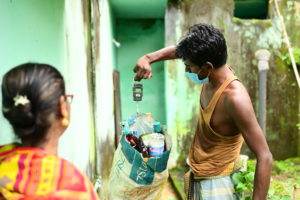
“I’m saving money after the Practical Action training on savings and entrepreneurship. I’ve learned that there are many opportunities in this occupation and I’ve been able to expand and make more money from it.”
Dipendra Kusle, Waste Collector in Kathmandu, Nepal
Learn more about our people-centred approach to the waste crisis.
Become a litter hero in your community
Would you like to do your bit to tidy up your local community? #LitterHeroes is Keep Britain Tidy’s way of supporting everyone who wants to do their bit to create a better environment on their doorstep and anyone who is already making a difference.
Visit Keep Britain Tidy and join the LitterHeroes.
Circular farming in schools in Peru
In Peru, remote schools have a problem with attendance. Schools are often not welcoming environments – they lack electricity, hot water and healthy lunches. We’re supporting Peruvian schools to get electricity and hot water. And training in circular gardening techniques means they can grow their own tasty, nutritious food and reduce waste.
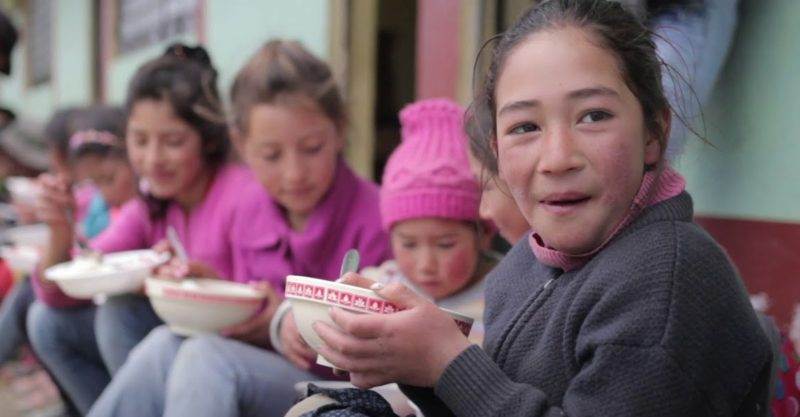
“Now we have our own organic vegetable garden. It’s an educational tool because it encourages the children to respect and take care of the environment.”
Janeth Portal, School Chef in San Pablo Province, Peru
Create your own zero-waste garden
Zero waste gardening is becoming increasingly popular in the UK too. Growing your own food, even if you have a small plot, can be extremely satisfying. Recycling waste products within your garden can make you feel even more self-sufficient. Why not start your own circular gardening project?
Read Zero Waste Week’s top circular gardening techniques.
Recycling plastic from rivers in Bangladesh
Plastic waste in rivers is a huge problem around the world. It pollutes waterways, causing illness and limiting livelihoods. Our new partnership with Lamor Foundation is cleaning up rivers in Bangladesh with new waste collection units. They’re creating jobs with better working conditions and fairer pay for informal waste collectors. And the waste plastic will be recycled into ultra clean fuel.
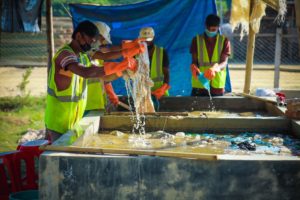
“Not only will we develop a second use for single use plastics, keeping them out of waterways, we will create cleaner slum and low-income areas in cities and dignified work that pays a decent wage to people who don’t have that right now.”
Sarah Roberts, Chief Executive, Practical Action
Read more about our work reducing plastic in oceans.
Reduce your plastic footprint
We can all play our part when it comes to reducing the amount of plastic in the world’s waterways. Avoiding single-use plastics, reusing plastic water bottles and choosing recyclable plastic products wherever possible are just three tactics for doing your bit.
Find out more ways to reduce your plastic footprint in this BBC Good Food guide.
Making clean fuel from wood by-products in Kenya
In Kenya, women are leading the way improving the health of people and the planet. Traditionally, trees have been cut down to provide fuel for cooking. Not only does this lead to deforestation, the smoke is bad for health. With our support, female entrepreneurs are creating low-smoke fuel using waste products – it’s a win-win for people and the environment.
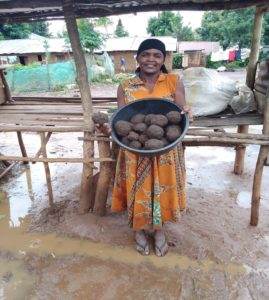
“People here used to think of cooking fuel businesses as dirty and unimportant. But through my training with Practical Action I decided to set up a new business. I used to live in poverty but thanks to this opportunity our lives have been transformed.”
Laventer Adhiambo, a Clean Cooking Entrepreneur, Busia County, Kenya
Switch to green energy for a quick win for the planet
The simplest and most impactful thing we can all do to reduce our carbon footprint is to review our energy use and switch to the greenest solutions. Ecotricity are offering to donate up to £60 to our work if you switch your electricity and/or gas to them.
Ecotricity generates all their electricity from wind and sun parks around Britain. It’s also certified vegan. Their gas is a mix of carbon-neutralised natural gas and sustainable green gas. Instead of paying dividends they invest your bills in building new forms of green energy.
Find out more and switch to Ecotricity.
Turning coffee skins into tasty treats in Nepal and Peru
The husks of coffee skins are usually thrown away by coffee farmers. But they’re a useful product that can be used in other food and drink products. We’re working with coffee farmers in Nepal and Peru to help them make a profit from this amazing “waste” product.
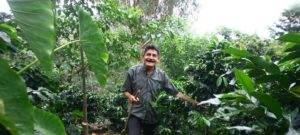
“It is a sustainable solution for the environment, and reduces waste thrown into rivers or other water sources. Besides, it provides additional sources of income for coffee producers by converting waste into cash and increasing job opportunities.”
Rudra Basnet, a coffee farmer from Sindhupalchok, Nepal.
Reuse your food waste with composting
How you dispose of your food waste has an impact on the environment. But you don’t need to turn your kitchen waste into food to make good use of it. Composting is an easy way to reduce food waste that would go to landfill and it’s very easy to get started.
Read the BBC Good Food guide to composting food waste at home.
Managing our waste
Explore Practical Action’s approach to waste management further through our Managing Our Waste 2021 report, which calls for a people-centred approach to the waste crisis. Find out how, rather than focusing on waste flows and particular types of waste, we must turn attention to the waste services people need, and to opportunities for the most marginalised to be a core part of the solution.
We’re working with people across the globe to implement ingenious ways to reuse or recycle waste. We can all do our bit, by supporting the waste heroes and by making small changes in our own lives that add up to a big difference.
Together, we can keep our communities healthy, reduce the amount of waste we produce and protect natural resources.